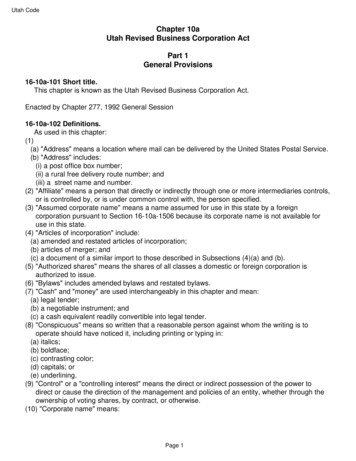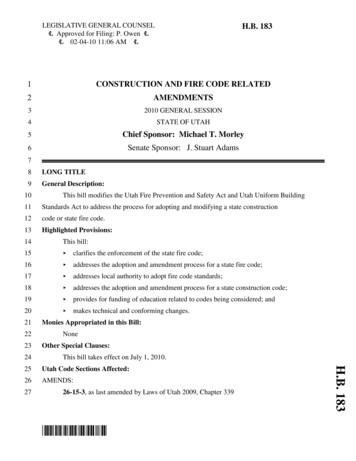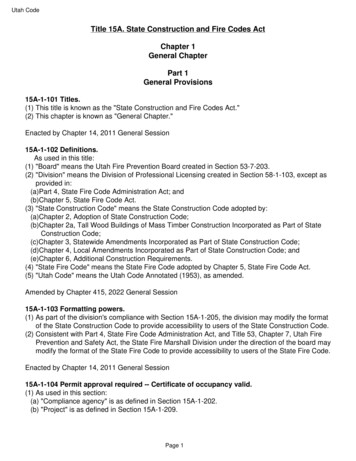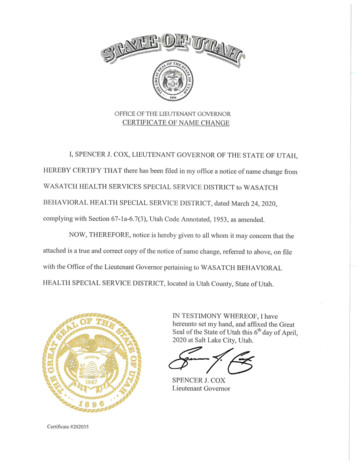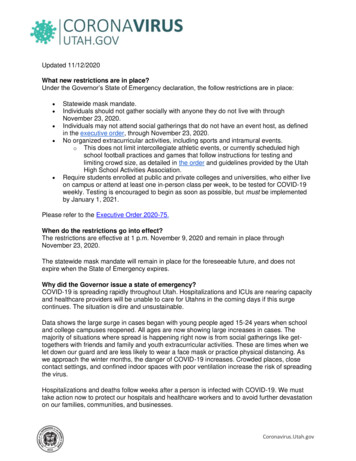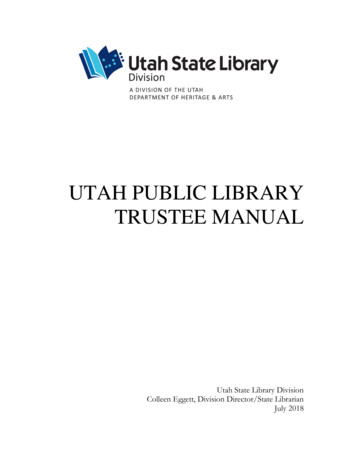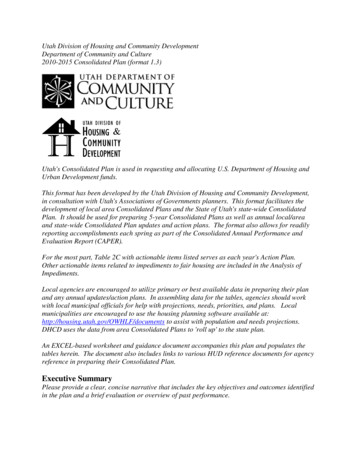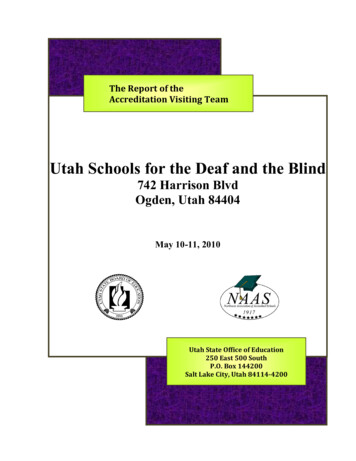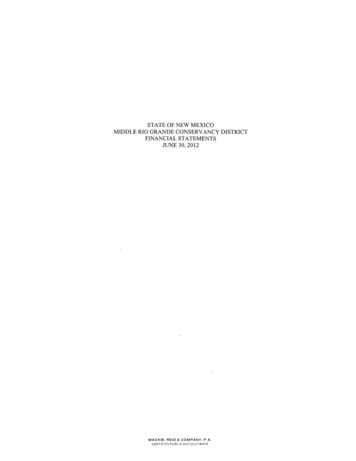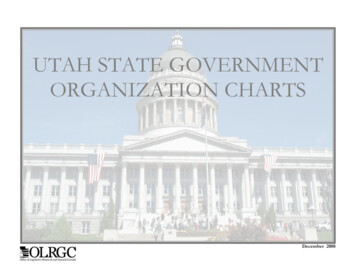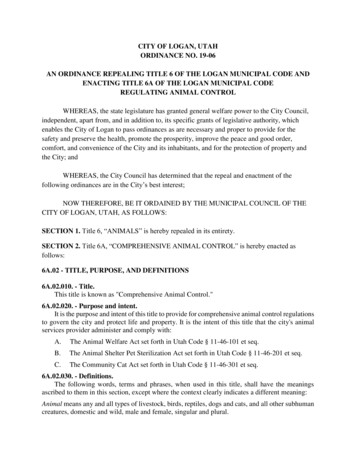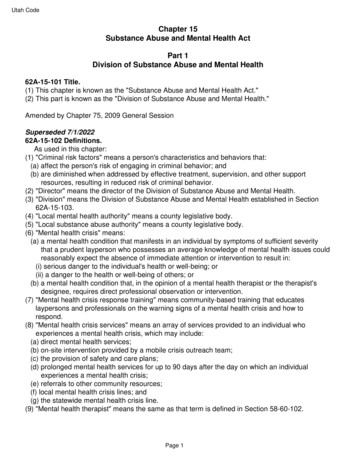
Transcription
Utah CodeChapter 15Substance Abuse and Mental Health ActPart 1Division of Substance Abuse and Mental Health62A-15-101 Title.(1) This chapter is known as the "Substance Abuse and Mental Health Act."(2) This part is known as the "Division of Substance Abuse and Mental Health."Amended by Chapter 75, 2009 General SessionSuperseded 7/1/202262A-15-102 Definitions.As used in this chapter:(1) "Criminal risk factors" means a person's characteristics and behaviors that:(a) affect the person's risk of engaging in criminal behavior; and(b) are diminished when addressed by effective treatment, supervision, and other supportresources, resulting in reduced risk of criminal behavior.(2) "Director" means the director of the Division of Substance Abuse and Mental Health.(3) "Division" means the Division of Substance Abuse and Mental Health established in Section62A-15-103.(4) "Local mental health authority" means a county legislative body.(5) "Local substance abuse authority" means a county legislative body.(6) "Mental health crisis" means:(a) a mental health condition that manifests in an individual by symptoms of sufficient severitythat a prudent layperson who possesses an average knowledge of mental health issues couldreasonably expect the absence of immediate attention or intervention to result in:(i) serious danger to the individual's health or well-being; or(ii) a danger to the health or well-being of others; or(b) a mental health condition that, in the opinion of a mental health therapist or the therapist'sdesignee, requires direct professional observation or intervention.(7) "Mental health crisis response training" means community-based training that educateslaypersons and professionals on the warning signs of a mental health crisis and how torespond.(8) "Mental health crisis services" means an array of services provided to an individual whoexperiences a mental health crisis, which may include:(a) direct mental health services;(b) on-site intervention provided by a mobile crisis outreach team;(c) the provision of safety and care plans;(d) prolonged mental health services for up to 90 days after the day on which an individualexperiences a mental health crisis;(e) referrals to other community resources;(f) local mental health crisis lines; and(g) the statewide mental health crisis line.(9) "Mental health therapist" means the same as that term is defined in Section 58-60-102.Page 1
Utah Code(10) "Mobile crisis outreach team" or "MCOT" means a mobile team of medical and mental healthprofessionals that, in coordination with local law enforcement and emergency medical servicepersonnel, provides mental health crisis services.(11)(a) "Public funds" means federal money received from the Department of Human Services or theDepartment of Health, and state money appropriated by the Legislature to the Department ofHuman Services, the Department of Health, a county governing body, or a local substanceabuse authority, or a local mental health authority for the purposes of providing substanceabuse or mental health programs or services.(b) "Public funds" include federal and state money that has been transferred by a local substanceabuse authority or a local mental health authority to a private provider under an annual orotherwise ongoing contract to provide comprehensive substance abuse or mental healthprograms or services for the local substance abuse authority or local mental health authority.The money maintains the nature of "public funds" while in the possession of the private entitythat has an annual or otherwise ongoing contract with a local substance abuse authority ora local mental health authority to provide comprehensive substance abuse or mental healthprograms or services for the local substance abuse authority or local mental health authority.(c) Public funds received for the provision of services pursuant to substance abuse or mentalhealth service plans may not be used for any other purpose except those authorized in thecontract between the local mental health or substance abuse authority and provider for theprovision of plan services.(12) "Severe mental disorder" means schizophrenia, major depression, bipolar disorders,delusional disorders, psychotic disorders, and other mental disorders as defined by the division.(13) "Statewide mental health crisis line" means the same as that term is defined in Section62A-15-1301.Amended by Chapter 303, 2020 General SessionEffective 7/1/202262A-15-102 Definitions.As used in this chapter:(1) "Criminal risk factors" means a person's characteristics and behaviors that:(a) affect the person's risk of engaging in criminal behavior; and(b) are diminished when addressed by effective treatment, supervision, and other supportresources, resulting in reduced risk of criminal behavior.(2) "Director" means the director appointed under Section 62A-15-104.(3) "Division" means the Division of Integrated Healthcare created in Section 26B-1-202.(4) "Local mental health authority" means a county legislative body.(5) "Local substance abuse authority" means a county legislative body.(6) "Mental health crisis" means:(a) a mental health condition that manifests in an individual by symptoms of sufficient severitythat a prudent layperson who possesses an average knowledge of mental health issues couldreasonably expect the absence of immediate attention or intervention to result in:(i) serious danger to the individual's health or well-being; or(ii) a danger to the health or well-being of others; or(b) a mental health condition that, in the opinion of a mental health therapist or the therapist'sdesignee, requires direct professional observation or intervention.Page 2
Utah Code(7) "Mental health crisis response training" means community-based training that educateslaypersons and professionals on the warning signs of a mental health crisis and how torespond.(8) "Mental health crisis services" means an array of services provided to an individual whoexperiences a mental health crisis, which may include:(a) direct mental health services;(b) on-site intervention provided by a mobile crisis outreach team;(c) the provision of safety and care plans;(d) prolonged mental health services for up to 90 days after the day on which an individualexperiences a mental health crisis;(e) referrals to other community resources;(f) local mental health crisis lines; and(g) the statewide mental health crisis line.(9) "Mental health therapist" means the same as that term is defined in Section 58-60-102.(10) "Mobile crisis outreach team" or "MCOT" means a mobile team of medical and mental healthprofessionals that, in coordination with local law enforcement and emergency medical servicepersonnel, provides mental health crisis services.(11)(a) "Public funds" means federal money received from the department, and state moneyappropriated by the Legislature to the department, a county governing body, or a localsubstance abuse authority, or a local mental health authority for the purposes of providingsubstance abuse or mental health programs or services.(b) "Public funds" include federal and state money that has been transferred by a local substanceabuse authority or a local mental health authority to a private provider under an annual orotherwise ongoing contract to provide comprehensive substance abuse or mental healthprograms or services for the local substance abuse authority or local mental health authority.The money maintains the nature of "public funds" while in the possession of the private entitythat has an annual or otherwise ongoing contract with a local substance abuse authority ora local mental health authority to provide comprehensive substance abuse or mental healthprograms or services for the local substance abuse authority or local mental health authority.(c) Public funds received for the provision of services under substance abuse or mental healthservice plans may not be used for any other purpose except those authorized in the contractbetween the local mental health or substance abuse authority and provider for the provision ofplan services.(12) "Severe mental disorder" means schizophrenia, major depression, bipolar disorders,delusional disorders, psychotic disorders, and other mental disorders as defined by the division.(13) "Statewide mental health crisis line" means the same as that term is defined in Section62A-15-1301.Amended by Chapter 255, 2022 General SessionSuperseded 7/1/202262A-15-103 Division -- Creation -- Responsibilities.(1)(a) There is created the Division of Substance Abuse and Mental Health within the department,under the administration and general supervision of the executive director.(b) The division is the substance abuse authority and the mental health authority for this state.(2) The division shall:Page 3
Utah Code(a)(i) educate the general public regarding the nature and consequences of substance abuse bypromoting school and community-based prevention programs;(ii) render support and assistance to public schools through approved school-based substanceabuse education programs aimed at prevention of substance abuse;(iii) promote or establish programs for the prevention of substance abuse within the communitysetting through community-based prevention programs;(iv) cooperate with and assist treatment centers, recovery residences, and other organizationsthat provide services to individuals recovering from a substance abuse disorder, byidentifying and disseminating information about effective practices and programs;(v) promote integrated programs that address an individual's substance abuse, mental health,and physical health;(vi) establish and promote an evidence-based continuum of screening, assessment, prevention,treatment, and recovery support services in the community for individuals with a substanceuse disorder or mental illness;(vii) evaluate the effectiveness of programs described in this Subsection (2);(viii) consider the impact of the programs described in this Subsection (2) on:(A) emergency department utilization;(B) jail and prison populations;(C) the homeless population; and(D) the child welfare system; and(ix) promote or establish programs for education and certification of instructors to educateindividuals convicted of driving under the influence of alcohol or drugs or driving with anymeasurable controlled substance in the body;(b)(i) collect and disseminate information pertaining to mental health;(ii) provide direction over the state hospital including approval of the state hospital's budget,administrative policy, and coordination of services with local service plans;(iii) make rules in accordance with Title 63G, Chapter 3, Utah Administrative RulemakingAct, to educate families concerning mental illness and promote family involvement, whenappropriate, and with patient consent, in the treatment program of a family member; and(iv) make rules in accordance with Title 63G, Chapter 3, Utah Administrative Rulemaking Act,to direct that an individual receiving services through a local mental health authority or theUtah State Hospital be informed about and, if desired by the individual, provided assistancein the completion of a declaration for mental health treatment in accordance with Section62A-15-1002;(c)(i) consult and coordinate with local substance abuse authorities and local mental healthauthorities regarding programs and services;(ii) provide consultation and other assistance to public and private agencies and groups workingon substance abuse and mental health issues;(iii) promote and establish cooperative relationships with courts, hospitals, clinics, medicaland social agencies, public health authorities, law enforcement agencies, education andresearch organizations, and other related groups;(iv) promote or conduct research on substance abuse and mental health issues, and submit tothe governor and the Legislature recommendations for changes in policy and legislation;(v) receive, distribute, and provide direction over public funds for substance abuse and mentalhealth services;Page 4
Utah Code(vi) monitor and evaluate programs provided by local substance abuse authorities and localmental health authorities;(vii) examine expenditures of local, state, and federal funds;(viii) monitor the expenditure of public funds by:(A) local substance abuse authorities;(B) local mental health authorities; and(C) in counties where they exist, a private contract provider that has an annual or otherwiseongoing contract to provide comprehensive substance abuse or mental health programsor services for the local substance abuse authority or local mental health authority;(ix) contract with local substance abuse authorities and local mental health authorities toprovide a comprehensive continuum of services that include community-based servicesfor individuals involved in the criminal justice system, in accordance with division policy,contract provisions, and the local plan;(x) contract with private and public entities for special statewide or nonclinical services, orservices for individuals involved in the criminal justice system, according to division rules;(xi) review and approve each local substance abuse authority's plan and each local mentalhealth authority's plan in order to ensure:(A) a statewide comprehensive continuum of substance abuse services;(B) a statewide comprehensive continuum of mental health services;(C) services result in improved overall health and functioning;(D) a statewide comprehensive continuum of community-based services designed to reducecriminal risk factors for individuals who are determined to have substance abuse or mentalillness conditions or both, and who are involved in the criminal justice system;(E) compliance, where appropriate, with the certification requirements in Subsection (2)(j);and(F) appropriate expenditure of public funds;(xii) review and make recommendations regarding each local substance abuse authority'scontract with the local substance abuse authority's provider of substance abuse programsand services and each local mental health authority's contract with the local mental healthauthority's provider of mental health programs and services to ensure compliance with stateand federal law and policy;(xiii) monitor and ensure compliance with division rules and contract requirements; and(xiv) withhold funds from local substance abuse authorities, local mental health authorities,and public and private providers for contract noncompliance, failure to comply with divisiondirectives regarding the use of public funds, or for misuse of public funds or money;(d) ensure that the requirements of this part are met and applied uniformly by local substanceabuse authorities and local mental health authorities across the state;(e) require each local substance abuse authority and each local mental health authority, inaccordance with Subsections 17-43-201(5)(b) and 17-43-301(6)(a)(ii), to submit a plan to thedivision on or before May 15 of each year;(f) conduct an annual program audit and review of each local substance abuse authority andeach local substance abuse authority's contract provider, and each local mental healthauthority and each local mental health authority's contract provider, including:(i) a review and determination regarding whether:(A) public funds allocated to the local substance abuse authority or the local mental healthauthorities are consistent with services rendered by the authority or the authority's contractprovider, and with outcomes reported by the authority's contract provider; andPage 5
Utah Code(B) each local substance abuse authority and each local mental health authority is exercisingsufficient oversight and control over public funds allocated for substance use disorder andmental health programs and services; and(ii) items determined by the division to be necessary and appropriate;(g) define "prevention" by rule as required under Title 32B, Chapter 2, Part 4, Alcoholic Beverageand Substance Abuse Enforcement and Treatment Restricted Account Act;(h)(i) train and certify an adult as a peer support specialist, qualified to provide peer supportsservices to an individual with:(A) a substance use disorder;(B) a mental health disorder; or(C) a substance use disorder and a mental health disorder;(ii) certify a person to carry out, as needed, the division's duty to train and certify an adult as apeer support specialist;(iii) make rules in accordance with Title 63G, Chapter 3, Utah Administrative Rulemaking Act,that:(A) establish training and certification requirements for a peer support specialist;(B) specify the types of services a peer support specialist is qualified to provide;(C) specify the type of supervision under which a peer support specialist is required tooperate; and(D) specify continuing education and other requirements for maintaining or renewingcertification as a peer support specialist; and(iv) make rules in accordance with Title 63G, Chapter 3, Utah Administrative Rulemaking Act,that:(A) establish the requirements for a person to be certified to carry out, as needed, thedivision's duty to train and certify an adult as a peer support specialist; and(B) specify how the division shall provide oversight of a person certified to train and certify apeer support specialist;(i) collaborate with the State Commission on Criminal and Juvenile Justice to analyze andprovide recommendations to the Legislature regarding:(i) pretrial services and the resources needed to reduce recidivism;(ii) county jail and county behavioral health early-assessment resources needed for anindividual convicted of a class A or class B misdemeanor; and(iii) the replacement of federal dollars associated with drug interdiction law enforcement taskforces that are reduced;(j) establish performance goals and outcome measurements for a mental health or substanceuse treatment program that is licensed under Chapter 2, Licensure of Programs and Facilities,and contracts with the department, including goals and measurements related to employmentand reducing recidivism of individuals receiving mental health or substance use treatmentwho are involved with the criminal justice system;(k) annually, on or before November 30, submit a written report to the Judiciary InterimCommittee, the Health and Human Services Interim Committee, and the Law Enforcementand Criminal Justice Interim Committee, that includes:(i) a description of the performance goals and outcome measurements described in Subsection(2)(j); and(ii) information on the effectiveness of the goals and measurements in ensuring appropriateand adequate mental health or substance use treatment is provided in a treatment programdescribed in Subsection (2)(j);Page 6
Utah Code(l) collaborate with the Administrative Office of the Courts, the Department of Corrections, theDepartment of Workforce Services, and the Board of Pardons and Parole to collect data onrecidivism, including data on:(i) individuals who participate in a mental health or substance use treatment program whileincarcerated and are convicted of another offense within two years after release fromincarceration;(ii) individuals who are ordered by a criminal court or the Board of Pardons and Parole toparticipate in a mental health or substance use treatment program and are convicted ofanother offense while participating in the treatment program or within two years after the dayon which the treatment program ends;(iii) the type of treatment provided to, and employment of, the individuals described inSubsections (2)(l)(i) and (ii); and(iv) cost savings associated with recidivism reduction and the reduction in the number ofinmates in the state;(m) at the division's discretion, use the data described in Subsection (2)(l) to make decisionsregarding the use of funds allocated to the division to provide treatment;(n) annually, on or before August 31, submit the data collected under Subsection (2)(l) and anyrecommendations to improve the data collection to the State Commission on Criminal andJuvenile Justice to be included in the report described in Subsection 63M-7-204(1)(x);(o) publish the following on the division's website:(i) the performance goals and outcome measurements described in Subsection (2)(j); and(ii) a description of the services provided and the contact information for the mental health andsubstance use treatment programs described in Subsection (2)(j) and residential, vocationaland life skills programs, as defined in Section 13-53-102; and(p) consult and coordinate with the Department of Health and the Division of Child and FamilyServices to develop and manage the operation of a program designed to reduce substanceabuse during pregnancy and by parents of a newborn child that includes:(i) providing education and resources to health care providers and individuals in the stateregarding prevention of substance abuse during pregnancy;(ii) providing training to health care providers in the state regarding screening of a pregnantwoman or pregnant minor to identify a substance abuse disorder; and(iii) providing referrals to pregnant women, pregnant minors, or parents of a newborn child inneed of substance abuse treatment services to a facility that has the capacity to provide thetreatment services.(3) In addition to the responsibilities described in Subsection (2), the division shall, within fundsappropriated by the Legislature for this purpose, implement and manage the operation of afirearm safety and suicide prevention program, in consultation with the Bureau of CriminalIdentification created in Section 53-10-201, including:(a) coordinating with the Department of Health, local mental health and substance abuseauthorities, a nonprofit behavioral health advocacy group, and a representative from aUtah-based nonprofit organization with expertise in the field of firearm use and safety thatrepresents firearm owners, to:(i) produce and periodically review and update a firearm safety brochure and other educationalmaterials with information about the safe handling and use of firearms that includes:(A) information on safe handling, storage, and use of firearms in a home environment;(B) information about at-risk individuals and individuals who are legally prohibited frompossessing firearms;(C) information about suicide prevention awareness; andPage 7
Utah Code(D) information about the availability of firearm safety packets;(ii) procure cable-style gun locks for distribution under this section;(iii) produce a firearm safety packet that includes the firearm safety brochure and the cablestyle gun lock described in this Subsection (3); and(iv) create a suicide prevention education course that:(A) provides information for distribution regarding firearm safety education;(B) incorporates current information on how to recognize suicidal behaviors and identifyindividuals who may be suicidal; and(C) provides information regarding crisis intervention resources;(b) distributing, free of charge, the firearm safety packet to the following persons, who shall makethe firearm safety packet available free of charge:(i) health care providers, including emergency rooms;(ii) mobile crisis outreach teams;(iii) mental health practitioners;(iv) other public health suicide prevention organizations;(v) entities that teach firearm safety courses;(vi) school districts for use in the seminar, described in Section 53G-9-702, for parents ofstudents in the school district; and(vii) firearm dealers to be distributed in accordance with Section 76-10-526;(c) creating and administering a rebate program that includes a rebate that offers between 10and 200 off the purchase price of a firearm safe from a participating firearms dealer or aperson engaged in the business of selling firearm safes in Utah, by a Utah resident;(d) in accordance with Title 63G, Chapter 3, Utah Administrative Rulemaking Act, making rulesthat establish procedures for:(i) producing and distributing the suicide prevention education course and the firearm safetybrochures and packets;(ii) procuring the cable-style gun locks for distribution; and(iii) administering the rebate program; and(e) reporting to the Health and Human Services Interim Committee regarding implementation andsuccess of the firearm safety program and suicide prevention education course at or beforethe November meeting each year.(4)(a) The division may refuse to contract with and may pursue legal remedies against any localsubstance abuse authority or local mental health authority that fails, or has failed, to expendpublic funds in accordance with state law, division policy, contract provisions, or directivesissued in accordance with state law.(b) The division may withhold funds from a local substance abuse authority or local mental healthauthority if the authority's contract provider of substance abuse or mental health programs orservices fails to comply with state and federal law or policy.(5)(a) Before reissuing or renewing a contract with any local substance abuse authority orlocal mental health authority, the division shall review and determine whether the localsubstance abuse authority or local mental health authority is complying with the oversight andmanagement responsibilities described in Sections 17-43-201, 17-43-203, 17-43-303, and17-43-309.(b) Nothing in this Subsection (5) may be used as a defense to the responsibility and liabilitydescribed in Section 17-43-303 and to the responsibility and liability described in Section17-43-203.Page 8
Utah Code(6) In carrying out the division's duties and responsibilities, the division may not duplicate treatmentor educational facilities that exist in other divisions or departments of the state, but shall workin conjunction with those divisions and departments in rendering the treatment or educationalservices that those divisions and departments are competent and able to provide.(7) The division may accept in the name of and on behalf of the state donations, gifts, devises, orbequests of real or personal property or services to be used as specified by the donor.(8) The division shall annually review with each local substance abuse authority and each localmental health authority the authority's statutory and contract responsibilities regarding:(a) use of public funds;(b) oversight of public funds; and(c) governance of substance use disorder and mental health programs and services.(9) The Legislature may refuse to appropriate funds to the division upon the division's failure tocomply with the provisions of this part.(10) If a local substance abuse authority contacts the division under Subsection 17-43-201(10) forassistance in providing treatment services to a pregnant woman or pregnant minor, the divisionshall:(a) refer the pregnant woman or pregnant minor to a treatment facility that has the capacity toprovide the treatment services; or(b) otherwise ensure that treatment services are made available to the pregnant woman orpregnant minor.(11) The division shall employ a school-based mental health specialist to be housed at the StateBoard of Education who shall work with the State Board of Education to:(a) provide coordination between a local education agency and local mental health authority;(b) recommend evidence-based and evidence informed mental health screenings andintervention assessments for a local education agency; and(c) coordinate with the local community, including local departments of health, to enhance andexpand mental health related resources for a local education agency.Amended by Chapter 187, 2022 General SessionAmended by Chapter 415, 2022 General SessionEffective 7/1/202262A-15-103 Division -- Creation -- Responsibilities.(1)(a) The division shall exercise responsibility over the policymaking functions, regulatoryand enforcement powers, rights, duties, and responsibilities outlined in state law thatwere previously vested in the Division of Substance Abuse and Mental Health within thedepartment, under the administration and general supervision of the executive director.(b) The division is the substance abuse authority and the mental health authority for this state.(2) The division shall:(a)(i) educate the general public regarding the nature and consequences of substance abuse bypromoting school and community-based prevention programs;(ii) render support and assistance to public schools through approved school-based substanceabuse education programs aimed at prevention of substance abuse;(iii) promote or establish programs for the prevention of substance abuse within the communitysetting through community-based prevention programs;Page 9
Utah Code(iv) cooperate with and assist treatment centers, recovery residences, and other organizationsthat provide services to individuals recovering from a substance abuse disorder, byidentifying and disseminating information about effective practices and programs;(v) promote integrated programs that address an individual's substance abuse, mental health,and physical health;(vi) establish and promote an evidence-based continuum of screening, assessment, prevention,treatment, and recovery support services in the community for individuals with a substanceuse disorder or mental illness;(vii) evaluate the effectiveness of programs described in this Subsection (2);(viii) consider the impact of the programs described in this Subsection (2) on:(A) emergency department utilization;(B) jail and prison populations;(C) the homeless population; and(D) the child welfare system; and(ix) promote or establish programs for education and certification of instructors to educateindividuals convicted of driving under the influence of alcohol or drugs or driving with anymeasurable controlled substance in the body;(b)(i) collect and disseminate information pertaining to mental health;(ii) provide direction over the state hospital including approval of the state hospital's budget,administrative policy, and coordination of services with local service plans;(iii) make rules in accordance with
Utah Code Page 1 Chapter 15 Substance Abuse and Mental Health Act Part 1 Division of Substance Abuse and Mental Health 62A-15-101 Title. (1) This chapter is known as the "Substance Abuse and Mental Health Act." (2) This part is known as the "Division of Substance Abuse and Mental Health." Amended by Chapter 75, 2009 General Session Superseded 7 .
